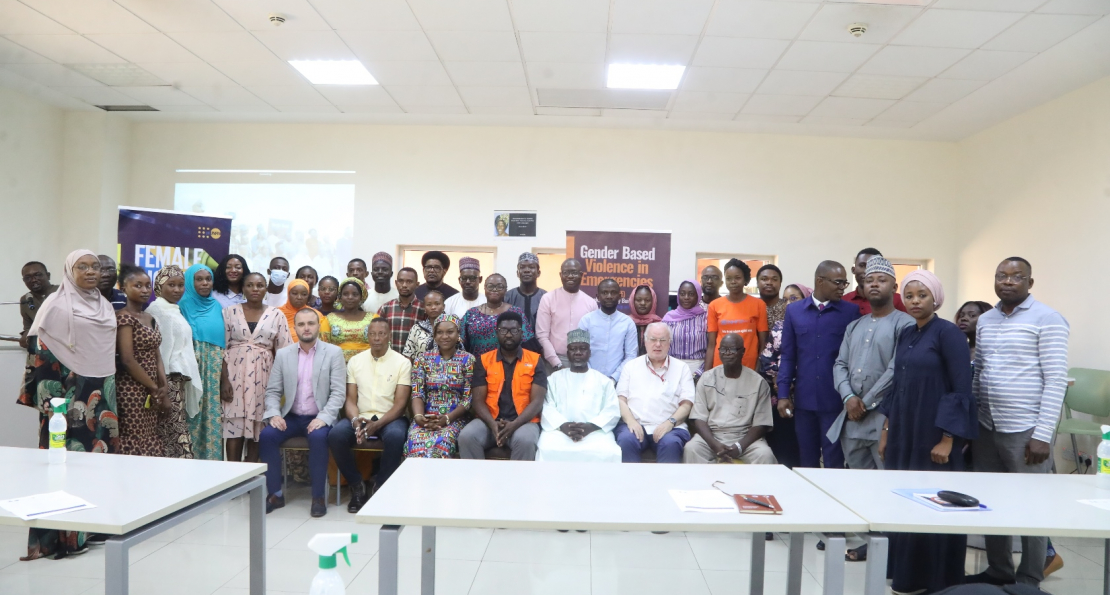The 6th cohort of the Gender-Based Violence in Emergencies (GBViE) capacity-building courses co-sponsored by the American University of Nigeria (AUN) and the United Nations Population Fund (UNFPA) commenced on October 18, 2022.
A total of thirty-seven successful applicants from Nigeria, Cameroon, Ethiopia, Kenya, South Sudan, Senegal, and Denmark are participating.
The sixth course in the series which is supported by the Swiss government is also taking a holistic and hybrid approach per global standards that focuses on the protection of women and girls from gender-based violence; their physical and emotional well-being as well as ensuring justice for victims of abuse.
At the formal opening ceremony on Tuesday, October 18, inside the 24-Hour Room of the Robert Pastor Library and E-Resource Center, Professor Yusuf Mohammed Yusuf, Dean of the AUN School of Law, highlighted the program's successes.
Dean Yusuf Mohammed commended the initiators and coordinators of the program for their professionalism and pledged the support of the American University of Nigeria for the continued hosting and successful delivery of the course. AUN, the Dean said, has created and deploys institutional mechanisms to tackle gender-based violence in the Community. AUN has a zero-tolerance policy against gender and any form of violence and this is further strengthened through a whistleblower policy that is both effective and anonymous.
Ms. Ulla Mueller, Resident Representative of UNFPA, appreciated how AUN has hosted the courses while commending the University’s commitment to excellence and community development.
Ms. Ulla, who joined the ceremony through a virtual video link, urged participants to put in their very best and take advantage of the tremendous opportunity of participating in the strategic program, noting that the project has recorded tremendous success since it was first inaugurated.
"I would like to congratulate AUN on its dedication to this program throughout the development stages and on becoming a fully integrated partner of the UNFPA. You have made significant contributions to achieving the transformative goals of the UNFPA and to putting an end to gender-based violence and harmful practices.
"If we maintain this focus on eradicating violence and promoting gender equality, we will succeed in achieving significant contributions towards crucial Sustainable Development Goals (SDGs), not only in Nigeria but also globally given the size of this nation", she stated.
Mr. Nicholas Martin-Achard, Humanitarian Advisor to the Swiss Embassy, described the AUN-UNFPA collaboration as significant since it aims at developing mechanisms that will end and prevent gender-related abuses by building capacity among stakeholders. He commended UNFPA and the Adamawa State Government for high-level engagement in the program and also for working closely with AUN for the benefit of society.
"Academic institutions are often overlooked by humanitarian actors as a key partner in preventing and responding to the needs of crisis-affected people. This is why we are glad to see the close collaboration between AUN and UNFPA on the design and delivery of this course.
"The Swiss government fully supports and commits to this program in response to the call to action to end violence in emergencies. We will eagerly anticipate the lessons learnt, successes recorded as well as challenges faced throughout the course.", he added.
The ceremony also featured feedback from participants of previous cohorts to reinforce the importance of the GBViE professional training course and its positive impacts on participants.
Mrs. Regina Gislambe, a midwife at the Modibbo Adama University Teaching Hospital (MAUTH), Yola, and a participant in the GBViE course Cohort 4, testified that the training has increased her confidence and empowered her competence as a caregiver.
"A lot of times, I come across cases of domestic violence while working with women as a midwife. I had limited experience on how to respond and handle these cases prior to enrolling in the AUN-UNFPA GBViE course, but after receiving training and education in emergency response, I became empowered to be more effective and efficient in dealing with these issues. I am also able to extend this knowledge to my colleagues as I have learned some new approaches and acquired new knowledge and became better in my practice."
Dr. Aniekan Ifon, a Resident Gynecologist also at MAUTH and a cohort 5 participant described the course as " a very comprehensive and transformative journey that is worth the time and effort considering the many affected people out there requiring our expertise."
Senior AUN Management, including Professor Patrick Fay, Dean of the School of Arts and Sciences, Professor Abubakar Sadiq Husseini, Dean of the School of Engineering, Dean Byron Bullock, Vice President for Student Affairs, Dr. Lionel von Rawlins, VP for Safety and Security, Adamawa State Government officials, representatives of NGOs and various United Nations agencies, were also present.
Reported by Tina Bitrus


